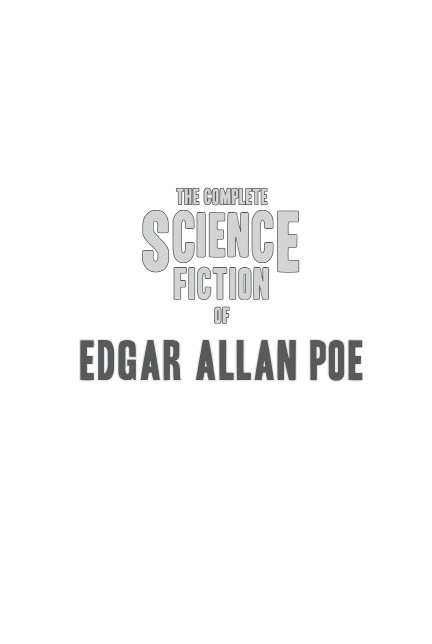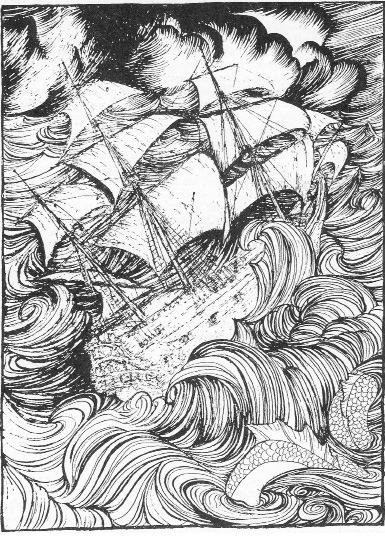Introduction
Poe’s Speculative Futures
Two centuries after his birth, Edgar Allan Poe enjoys widespread and well-deserved fame for his tales of satire and black humor, his tales of mystery and detection, and his tales of terror.
Without Poe’s “tales of ratiocination,” Sir Arthur Conan Doyle could never have created the character of Sherlock Holmes in the way he did. Without Poe’s poetry and fiction, Surrealism in France might have starved and withered for lack of adequate nourishment. Without Poe’s criticism, T.S. Eliot’s critical authority might never have achieved its crusty maturity.
And without Poe’s stories of the “speculative future,” Jules Verne would never have become the Jules Verne whose name still sells books – he of Around the World in Eighty Days and A Journey to the Center of the Earth. Many of Verne’s best-loved novels – his most imaginative and forward-looking – were directly inspired by Poe’s ideas; and most if not all were influenced by his example.
Given that the first American science fiction magazine’s masthead featured an image of Jules Verne reaching skyward from the grave, it seems doubtful Amazing Stories would have turned out to be the same, had Verne not produced his substantial body of imaginative work. And if Amazing Stories would have been different – if it, indeed, would have come into existence at all in the absence of Verne – what might have become of American science fiction as a whole? Would it have taken root with the vitality that it did?
Verne was an inspiration to American writers to work out the logical implications of their own most far-reaching dreams – thanks to Poe.
★ ★ ★
As would later writers of the imagination, Poe looked both to the near future and the far.
As a careful observer of scientific and technical progress, he imagined practical inventions nearly within reach – as in his story for the New York Sun, in 1844, describing a powered balloon flight across the Atlantic.
“If (as some assert) the ‘Victoria’ did not absolutely accomplish the voyage recorded,” Poe would write later of the hoax, “it will be difficult to assign a reason why she should not have accomplished it.”
His near-future imaginings addressed geography and travel, as did his early story “MS. Found in a Bottle.” This particular story offers more than geographical adventure, however – for its narrator encounters an immense sea-going vessel unknown to Poe’s world, embodying a strange conception: an ocean-going ship that may have been literally alive. Poe’s considerably longer story of exploration, “The Narrative of Arthur Gordon Pym of Nantucket,” exerted special influence upon Verne, with its hauntingly strange ending at the Pole.
Poe was aware his efforts were new, in imaginative story-telling. Others before him had written imaginative journeys – even to the moon, which Poe tackled in “Hans Pfaall.” In moon journeys before his, Poe wrote, “the aim is always satirical; the theme being a description of Lunarian customs as compared with ours. In none, is there any effort at plausibility in the details of the voyage itself. ... In ‘Hans Pfaall’ the design is original, inasmuch as regards an attempt at verisimilitude, in the application of scientific principles (so far as the whimsical nature of the subject would permit,) to the actual passage between the earth and the moon.”
Poe tackled many themes that would become commonplace in later imaginative fiction. Of the several stories describing global cataclysm in astronomical terms, the earliest was “The Conversation of Eiros and Charmion” – notable not only for its realistic depiction of cosmic catastrophe, but also for the notions that inspired Verne’s more comic Doctor Ox’s Experiment.
Some of Poe’s speculations may greatly surprise the reader, because of their Modern flavor. In one essay, “The Island of the Fay,” written to provide text beneath an illustrative plate, Poe describes our planet as “one vast and sentient whole,” anticipating the 20th-century Gaean theory. Just as startling is Poe’s statement and elaboration on the Butterfly Effect – “no act is without infinite result” – in “The Power of Words.” Poe imagined a future in which mathematicians would have full computational command of this effect – not anticipating, at least within this story, the wrench Chaos theory would throw into such works. This same story concludes, as hinted by its title, at the understanding that provided the underpinning for 20th-century Teilhardian notions, the literal “power of words.”
Even more astonishing are some of his astronomical speculations – which, for instance, come circling near the concept of the black hole in “Mesmeric Revelation.” In the amazing Eureka, Poe goes further and arrives, purely by means of logic, at the idea that such a compressed “unity” would be beyond the realm of matter. The notion of the Universe arising from such a “unity” – and then of there existing an oscillating relationship, between Universe and Unity – will further surprise those who regard such ideas as purely of the 20th and 21st centuries.
Poe was naturally interested in marvelous inventions, as well. Magnetically-powered ocean liners, high-speed trains, skyscrapers, and trans-oceanic cables were among them. Most impressively, however, is Poe’s realization that for a journey to be undertaken, in a practical way, beyond Earth’s atmosphere, some means of hermetically sealing the traveler in against airless space was necessary, along with some means of propagating atmosphere within the enclosed vehicle. Poe’s was a concept – a purely rational one – that anticipated the practical reality of the space capsule, and the philosophic notion of the ecosphere.
Poe held no spiritual beliefs, and looked down upon the “mystical” practices enjoying popularity in his time. Even so, he applied the same approach of verisimilitude, and of the hoax, in speculating about mesmerism as if factual. His use of religious notions, such as God or Angel, are also, as the reader will discover, rational and materialist.
★ ★ ★
The text-versions in this volume have been restored to close to their original published form, insofar as was possible. While there may be some youthful excesses – as in the comparative measure of “a million times” in one story, which Poe later and more cautiously revised to “a hundred times” – they reflect a youthful exuberance of expression worth preserving. Some original spellings (and all original word choices) are retained for their evocation of Poe’s times, as well.
Mark Rich
September 2009


MS. Found in a Bottle
1935 illustration by Arthur Rackham